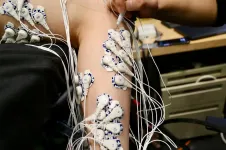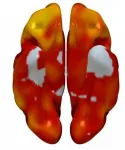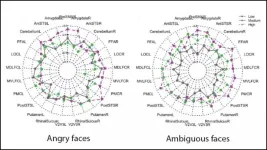(Press-News.org) Below please find summaries of new articles that will be published in the next issue of Annals of Internal Medicine. The summaries are not intended to substitute for the full articles as a source of information. This information is under strict embargo and by taking it into possession, media representatives are committing to the terms of the embargo not only on their own behalf, but also on behalf of the organization they represent.
1. Zika vaccine candidate shows promise in phase I trial
Abstract: https://www.acpjournals.org/doi/10.7326/M20-5306
Editorial: https://www.acpjournals.org/doi/10.7326/M21-0397
URL goes live when the embargo lifts
The Zika virus candidate, Ad26.ZIKV.001, a replication-incompetent human adenovirus serotype 26 (ad26) vector showed promising safety and immunogenicity in a phase I clinical trial. Researchers say the vaccine warrants further development should the need reemerge. The findings are published in Annals of Internal Medicine.
Zika virus (ZIKV) infection is transmitted via mosquito or sexually and may cause severe congenital disease after maternal-fetal transmission. The incidence of Zika virus has declined since the 2015-2016 outbreak, but geographic expansion of the Aedes aegypti mosquito to areas where population-level immunity is low poses a substantial risk for future epidemics. Currently, no vaccine is available.
Researchers from Janssen Vaccines and Prevention and Beth Israel Deaconess Medical Center randomly assigned 100 healthy participants to either a 1- or 2-dose regimen of Ad26.ZIKV.001 or placebo to assess the safety and immunogenicity of the Zika vaccine candidate. They found that 2 doses of Ad26.ZIKV.001 were safe, caused mild to moderate reactogenicity, and induced persistent neutralizing antibody responses. Transferred antibodies were found to be protective in a mouse Zika challenge model. Antibody responses up to 1 year after vaccination were observed in at least 80% of participants in both 2-dose (high and low) groups, indicating that a low dose would be sufficient. A single-dose vaccine had lower peak neutralizing antibody responses than the 2-dose strategies but nevertheless showed durable antibody titers at 1 year, and thus may be a useful tool in curbing future Zika epidemics.
Media contacts: For an embargoed PDF, please contact Angela Collom at acollom@acponline.org. The corresponding authors, Nadine C. Salisch, PhD, and Dan H. Barouch, MD, PhD, can be reached at NSalisch@its.jnj.com.
2. Study suggests Zika blood screening policy may not be necessary or cost effective
Abstract: https://www.acpjournals.org/doi/10.7326/M20-6879
Editorial: https://www.acpjournals.org/doi/10.7326/M21-0397
URL goes live when the embargo lifts
A modeling study finds that universal screening of blood donations for Zika virus may not be necessary or cost effective, as the risk of serious adverse events from transfusion-transmitted Zika virus is exceedingly low. A resurgence of Zika that is even larger than the 2016-17 pandemic (which the author says is not likely) would be needed for the expected rate of serious adverse events from transfusion-transmitted Zika to exceed once-per-decade levels. The findings are published in Annals of Internal Medicine.
A 2019 simulation study found that screening the blood supply for Zika, which began in 2016, was not cost-effective in the 50 states during the first year. Despite these findings, the Blood Products Advisory Committee recommended continuing universal screening, which costs blood centers a collective $8 to $13 million each month. Discussions on this policy have been tabled due to the coronavirus pandemic, but the modeler suggests that this data could help to inform regulatory decisions.
A researcher from Stanford University used a simulation model to estimate the relationship between the rate of Zika-infectious donations and the rate of adverse outcomes due to transfusion-transmitted Zika in the 50 states without screening and estimate the 2018 cost-effectiveness of universal screening. At the rate of Zika-infectious donations from 2018, the report estimates that the rate of serious adverse events from transfusion-transmitted Zika would be below 1 congenital Zika syndrome case every 1,484 years and 1 Guillain-Barre syndrome case every 1,035 years. The report also estimates that universal screening with mini-pooled nucleic acid testing (the current standard) costs $5.1 billion per quality-adjusted life year gained (98% Credible Interval $0.77 - $16 billion). According to the study author, collaboration between modelers and policy-makers could enhance the policy relevance of modeling studies.
Media contacts: For an embargoed PDF, please contact Angela Collom at acollom@acponline.org. The corresponding author, W. Alton Russell, can be reached directly at altonr@stanford.edu.
3. Immune checkpoint inhibitors may not cause serious flare ups in patients with preexisting autoimmune diseases
Abstract: https://www.acpjournals.org/doi/10.7326/M20-3419
URL goes live when the embargo lifts
Immune checkpoint inhibitors (ICI) may not trigger serious flare ups in patients with melanoma and preexisting autoimmune diseases. However, adverse events may be more likely in patients with inflammatory bowel disease (IBD). Findings from a nationwide cohort study are published in Annals of Internal Medicine.
ICI can increase survival and lead to long-lasting responses in patients with melanoma. But because ICIs have been shown to cause immune-related adverse events mimicking immunologic diseases, patients with preexisting autoimmune disease have been excluded from clinical trials.
Researchers from Leiden University Medical Center, the Netherlands studied over 4,000 patients enrolled in the Dutch Melanoma Treatment Registry to test the hypothesis that serious immune-related adverse events would occur more frequently in patients treated with ICI with advanced melanoma and autoimmune diseases than in patients without autoimmune diseases. They also compared baseline characteristics, treatment choices, response, and survival after ICI.
The researchers found that tumor response to ICI treatment and incidence of immune-related adverse events of grade 3 or higher were similar in patients with and without preexisting autoimmune disease of rheumatologic or endocrine origin in daily clinical practice. For patients with IBD, the researchers noted higher incidence of severe colitis and early discontinuation of treatment due to toxicity. These findings suggest that physicians do not need to withhold ICI in patients with the most common autoimmune diseases. However, close monitoring in patients with IBD is advised.
Media contacts: For an embargoed PDF, please contact Angela Collom at acollom@acponline.org. The corresponding author, Ellen Kapiteijn, MD, PhD, can be reached directly at h.w.kapiteijn@lumc.nl.
Also in this issue:
Perioperative Management of Patients on Glucocorticoids
Caputo
Consult Guys
https://www.acpjournals.org/doi/10.7326/W20-0018
Trends in Endocarditis Associated with Injection of Illicit Drugs
Centor
Annals On Call
https://www.acpjournals.org/doi/10.7326/A20-0007
INFORMATION:
A new paper refines estimates of when herbivorous dinosaurs must have traversed North America on a northerly trek to reach Greenland, and points out an intriguing climatic phenomenon that may have helped them along the journey.
The study, published today in Proceedings of the National Academy of Sciences, is authored by Dennis Kent, adjunct research scientist at Columbia University's Lamont-Doherty Earth Observatory, and Lars Clemmensen from the University of Copenhagen.
Previous estimates suggested that sauropodomorphs -- a group of long-necked, herbivorous dinosaurs that eventually included Brontosaurus and Brachiosaurus ...
Experts have devised a novel approach to selecting photos for police lineups that helps witnesses identify culprits more reliably.
In a paper published by the Proceedings of the National Academy of Sciences, researchers - from the University of California San Diego and Duke University in the United States and the University of Birmingham in the U.K. - show for the first time that selecting fillers who match a basic description of the suspect but whose faces are less similar, rather than more, leads to better outcomes than traditional approaches in the field.
The counterintuitive technique improves eyewitness performance by about 10 percent.
"In ...
CAMBRIDGE, MA -- MIT researchers have invented a new type of amputation surgery that can help amputees to better control their residual muscles and sense where their "phantom limb" is in space. This restored sense of proprioception should translate to better control of prosthetic limbs, as well as a reduction of limb pain, the researchers say.
In most amputations, muscle pairs that control the affected joints, such as elbows or ankles, are severed. However, the MIT team has found that reconnecting these muscle pairs, allowing them to retain their normal push-pull ...
The threat of landslides is again in the news as torrential winter storms in California threaten to undermine fire-scarred hillsides and bring deadly debris flows crashing into homes and inundating roads.
But it doesn't take wildfires to reveal the landslide danger, University of California, Berkeley, researchers say. Aerial surveys using airborne laser mapping -- LiDAR (light detection and ranging) -- can provide very detailed information on the topography and vegetation that allow scientists to identify which landslide-prone areas could give way during an expected rainstorm. This is especially ...
More than one-third of the Corn Belt in the Midwest - nearly 100 million acres - has completely lost its carbon-rich topsoil, according to University of Massachusetts Amherst research that indicates the U.S. Department of Agricultural has significantly underestimated the true magnitude of farmland erosion.
In a paper published in the Proceedings of the National Academy of Sciences, researchers led by UMass Amherst graduate student Evan Thaler, along with professors Isaac Larsen and Qian Yu in the department of geosciences, developed a method using satellite ...
The links between cardiovascular disease and cognitive impairment begin years before the appearance of the first clinical symptoms of either condition. In a study carried out at the Centro Nacional de Investigaciones Cardiovasculares (CNIC) in partnership with Santander Bank and neuroimaging experts at the Barcelonaβeta Brain Research Center (BBRC, the research center of the Fundación Pasqual Maragall), the investigators have identified a link between brain metabolism, cardiovascular risk, and atherosclerosis during middle age, years before the first appearance of symptoms.
The report, published in the Journal of the American College of Cardiology (JACC), ...
Employing cardiovascular disease prevention strategies in mid-life may delay or stop the brain alterations that can lead to dementia later in life, according to a study in the Journal of the American College of Cardiology.
Atherosclerosis, or buildup of fats, cholesterol and other substances in and on artery walls, is the underlying cause of most cardiovascular diseases, which is the leading cause of death around the world. Dementia is also among the top causes of death and disability around the world, with 50 million people currently living with dementia. ...
In a new study out of University of California San Diego School of Medicine, researchers found a drug used for heart failure improves symptoms associated with postural orthostatic tachycardia syndrome, otherwise known as POTS. This complex, debilitating disorder affects the body's autonomic nervous system, causing a high heart rate, usually when standing.
Writing in the February 15, 2021 online issue of the Journal of the American College of Cardiology, study authors investigated the drug ivabradine and its effects on heart rate, quality of life and plasma norepinephrine levels in persons living with POTS. Norepinephrine is a stress hormone and neurotransmitter. In blood plasma, it is used as a measure of sympathetic nervous system activity. Trial participants experienced a reduction in ...
Young men with lower testosterone levels throughout puberty become more sensitive to how the hormone influences the brain's responses to faces in adulthood, according to new research published in JNeurosci.
During prenatal brain development, sex hormones like testosterone organize the brain in permanent ways. But research suggests that testosterone levels during another developmental period -- puberty -- may have long-lasting effects on brain function, too.
Liao et al. examined the relationship between puberty testosterone levels and the brain's response to faces. Liao's team recruited 500 men around age 19 who had been participants in the Avon Longitudinal Study of Parents and ...
PITTSBURGH, Feb. 15, 2021 - By capitalizing on a convergence of chemical, biological and artificial intelligence advances, University of Pittsburgh School of Medicine scientists have developed an unusually fast and efficient method for discovering tiny antibody fragments with big potential for development into therapeutics against deadly diseases.
The technique, published today in the journal Cell Systems, is the same process the Pitt team used to extract tiny SARS-CoV-2 antibody fragments from llamas, which could become an inhalable COVID-19 treatment for humans. This approach has the potential to quickly identify multiple potent nanobodies that target different parts of a pathogen--thwarting ...




